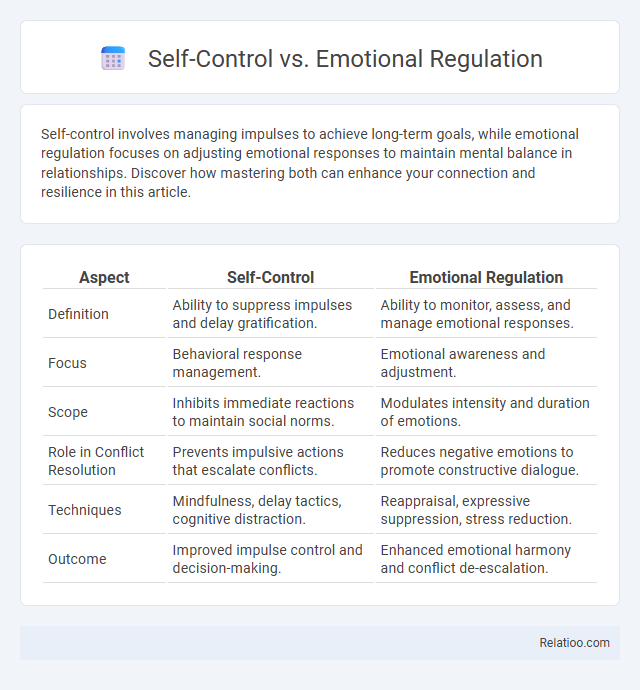Self-control involves managing impulses to achieve long-term goals, while emotional regulation focuses on adjusting emotional responses to maintain mental balance in relationships. Discover how mastering both can enhance your connection and resilience in this article.
Table of Comparison
| Aspect | Self-Control | Emotional Regulation |
|---|---|---|
| Definition | Ability to suppress impulses and delay gratification. | Ability to monitor, assess, and manage emotional responses. |
| Focus | Behavioral response management. | Emotional awareness and adjustment. |
| Scope | Inhibits immediate reactions to maintain social norms. | Modulates intensity and duration of emotions. |
| Role in Conflict Resolution | Prevents impulsive actions that escalate conflicts. | Reduces negative emotions to promote constructive dialogue. |
| Techniques | Mindfulness, delay tactics, cognitive distraction. | Reappraisal, expressive suppression, stress reduction. |
| Outcome | Improved impulse control and decision-making. | Enhanced emotional harmony and conflict de-escalation. |
Understanding Self-Control: Definition and Importance
Self-control refers to the ability to manage impulses, resist short-term temptations, and maintain focus on long-term goals, playing a crucial role in personal and professional success. Emotional regulation involves modulating emotional responses to achieve adaptive outcomes, which supports effective decision-making and stress management. Understanding self-control is essential for enhancing behavioral consistency, improving mental health, and fostering resilience in challenging situations.
Emotional Regulation: What It Means and Why It Matters
Emotional regulation involves managing and responding to your emotional experiences in a balanced way, helping prevent impulsive reactions often confused with self-control, which specifically refers to resisting temptations or urges. Understanding emotional regulation enhances your ability to navigate stress, improve relationships, and maintain mental well-being by recognizing, labeling, and modulating emotions effectively. Prioritizing emotional regulation fosters resilience, enabling you to handle challenges with greater awareness and deliberate responses, proving essential for personal growth and decision-making.
Key Differences Between Self-Control and Emotional Regulation
Self-control involves managing impulses and delaying gratification to achieve long-term goals, whereas emotional regulation focuses on modifying emotional responses to maintain psychological balance. Key differences include self-control's emphasis on resisting temptations and enforcing discipline, while emotional regulation centers on understanding, processing, and altering emotional experiences. Effective emotional regulation often supports self-control by reducing emotional interference, enhancing decision-making and behavior management.
Neuroscience Behind Self-Control and Emotion Regulation
Neuroscience research reveals that self-control and emotional regulation rely on overlapping but distinct neural circuits primarily involving the prefrontal cortex, which governs executive functions, and the amygdala, which processes emotional responses. Self-control engages the dorsolateral prefrontal cortex to inhibit impulses and make deliberate decisions, while emotional regulation activates the ventromedial prefrontal cortex to modulate emotional reactions and maintain homeostasis. Functional MRI studies show that strengthening these pathways through practice can enhance behavioral inhibition and emotional resilience, highlighting the brain's plasticity in managing both impulse control and affective states.
Everyday Examples: Self-Control vs Emotional Regulation
Self-control involves resisting impulses like avoiding junk food despite cravings, while emotional regulation includes managing feelings such as calming anger during a stressful meeting. Everyday examples highlight self-control when choosing to save money rather than make impulsive purchases, whereas emotional regulation appears in soothing anxiety before public speaking. Both skills improve decision-making but emotional regulation primarily targets altering emotional responses, contrasting with self-control's focus on behavioral restraint.
Benefits of Strengthening Self-Control Skills
Strengthening self-control skills enhances decision-making, reduces impulsive behaviors, and promotes better stress management, leading to improved emotional regulation and overall mental well-being. It supports the ability to delay gratification and maintain focus on long-term goals, resulting in higher academic and professional achievement. Enhanced self-control also contributes to healthier relationships by enabling individuals to respond thoughtfully rather than react emotionally.
Enhancing Emotional Regulation for Mental Well-being
Enhancing emotional regulation directly improves mental well-being by empowering you to manage emotional responses effectively and reduce stress. Unlike general self-control, which focuses on inhibiting impulses, emotional regulation involves recognizing, understanding, and adjusting emotions to maintain psychological balance. Developing skills such as mindfulness, cognitive reappraisal, and breathing techniques can strengthen your emotional regulation capacity and promote resilience against mental health challenges.
Strategies to Improve Self-Control and Emotional Regulation
Effective strategies to improve self-control and emotional regulation include mindfulness meditation, cognitive restructuring, and developing healthy habits like regular exercise and sleep. You can enhance self-control by setting clear goals, using implementation intentions, and practicing delay of gratification techniques. Emotional regulation improves through recognizing emotional triggers, practicing deep breathing, and engaging in positive self-talk to manage stress responses.
Common Challenges and How to Overcome Them
Common challenges in self-control, emotional regulation, and stress management include impulsivity, difficulty recognizing emotional triggers, and maintaining consistent coping strategies. You can overcome these obstacles by developing mindfulness practices, identifying specific stressors, and implementing structured routines that reinforce positive behaviors. Building resilience involves continuous self-awareness and adapting techniques such as deep breathing, cognitive reframing, and gradual exposure to challenging situations.
Integrating Self-Control and Emotional Regulation for Personal Growth
Integrating self-control and emotional regulation enhances your ability to manage impulses and respond thoughtfully to emotional triggers, fostering resilience and personal growth. Emotional regulation involves recognizing and modulating feelings, while self-control focuses on restraining immediate reactions and maintaining goal-oriented behavior. Combining these skills improves decision-making, stress management, and overall mental well-being.

Infographic: Self-control vs Emotional Regulation
 relatioo.com
relatioo.com